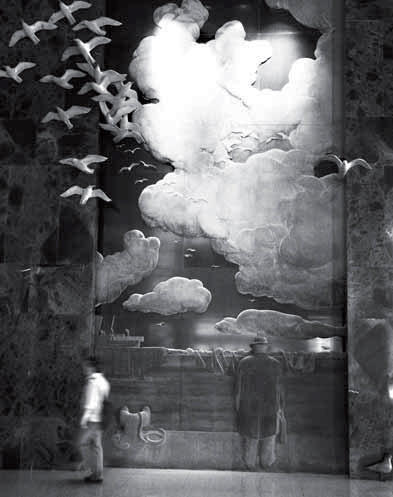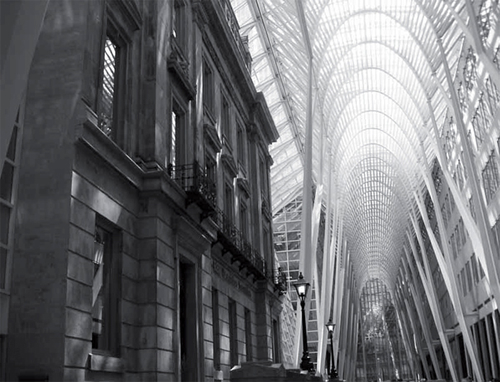At SPUR, we try to look for the best and brightest, for the most creative ways of thinking about cities, and learning from those creative individuals who have those ideas and ideals. In Toronto, we were very fortunate in meeting with Pier Giorgio Di Cicco, poet larueate of Toronto. The biography in his book Municipal Mind: Manifestos for the Creative City, (Mansfield Press, Toronto, 2007) tells us that Di Cicco has “extended the role of poet laureate beyond the area of arts advocacy and into the realm of ‘civic aesthetic,’ a term he coined to define building a city through citizenship, civic ethic and urban psychology.” And not a little of the art of the poet, I should add.

Intriguing words, but what might these somewhat abstract characteristics mean for us as city planners and urbanists at SPUR?
Let’s go back a little in history. Torontonians were fond of telling us that the United States was founded for “Life, Liberty and the pursuit of Happiness”1 and that Canada was founded for “Peace, Order and Good Government1.” Indeed, Canada has the reputation of possessing — and, as we saw on our brief visit, exhibits — a certain civility, a little more sense of the commons and less sense of personal pursuit than we often see in San Francisco civic life. And we could discern this very clearly in Di Cicco’s message of mutual respect and civility in the public discourse and in public design, of balancing common values and individual needs.
We have long talked about SPUR as a place where there is respectful debate, where we encourage a multiplicity of viewpoints, and where the final decision is richer and fairer and better for the diversity and debate. Di Cicco applies this modus operandi to the whole city, asking for it to be a place designed to promote civil exchange. “Today, we have a paucity of civil encounter in our cities” he told us. “A city should be a place where you discover your identity through interchange with other people. Cities need to engage the random.” Instead, he finds a zeitgeist of civic withdrawal, of cities designed to encourage distrust of the public realm.
Our task, according to Di Cicco, is to revitalize civic faith. “SPUR should be a funnel for love and loyalty for San Francisco,” he told us. He believes not so much that bad city design leads to civil strife, but rather that city design today is often bad precisely because people don’t like each other and don’t like a sense of community.
His book is a series of poetic reflections on what makes up a good city. A few selections from Municipal Mind that particularly resonated with me:
“The purpose of the arts in a city is to make a city fall in love with itself.” (p. 19)
Di Cicco teaches us that it is not destination points that attract people to Paris or Rome or San Francisco, not the official art, but rather the atmosphere of creativity that is both attractive and attracting. An inadvertent but good plug, perhaps, for “San Francisco values?”
“A creative city motivates a citizenry to a humane reflection on itself by looking, speaking, engaging freely.” (p. 31)
This kind of engagement, he tells us, requires a level of trust that often is missing in the civic debate. One cannot help but look at a typical form of civic debate in San Francisco — “sides” lining up, pro against con, each for their three minutes of fame testifying at City Hall. Is there ever any real communication, any indication of trust, or is it show business reinforcing what each of us already believes to be true? Has our system of testimony eliminated real engagement?

“There is a paradox in the civic nature. The citizen resents densification, yet wants to be seduced to public encounter.” (p. 41)
Di Ciccio, who incidentally also works as a city planning consultant, sees this dichotomy as creating a tension between public and private space that cannot be resolved by urban design, but only by citizens configuring contradictory desires and making an art of the paradox.
“There is one essential philosophical criteria (sic) for urban design, and it is the notion of “welcome.” (p. 46)
Di Ciccio sees generosity of spirit as a basic ethic in any city-building, an ethic that welcomes first its citizens and then the world. One must be able to be comfortable in buildings, on streets and, ultimately, in civic life. Civic design must inspire trust. And this requires poets and artists as well as architects, landscape architects and urban planners to intuit the wholeness required by the human experience.
“The livable city is a conversation that does not bore or shout or offend.” (p. 49)
Our poet makes a plea for the everyday, the unpretentious and the hospitable — the city that is both alive and lived in, un-whitewashed and unembarrassed by a workaday past. He cautions us not to confuse unassuming with mundane, for this is the city that attracts true city-lovers rather than slaves to “lifestyle.”
“City soul is located in the architecture of the space between people and is predicated by congruent aspirations and social commonality. … An ugly city speaks of a soul derogative to itself. A lovely city speaks of people who have sought a higher version of themselves.” (p. 58-59)
We can be honored that Di Ciccio asks SPUR to be a “funnel of love and loyalty for San Francisco.” These are not usual terms for city planners to use, but understood in his poetic terms, they are a call for mutual respect, interaction among citizens and the balancing of the commons with individual needs. Can a city be a poem? That is, something particularly lovely beautiful, or delightful? Pier Georgio Di Cappio clearly believes it can. And that is it our job to make San Francisco this poem.